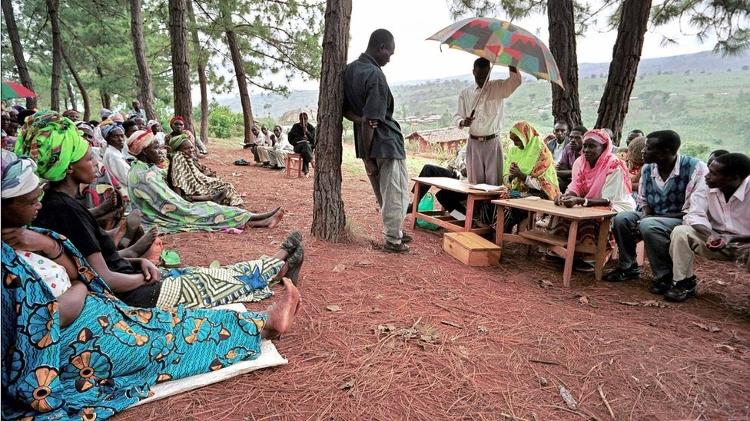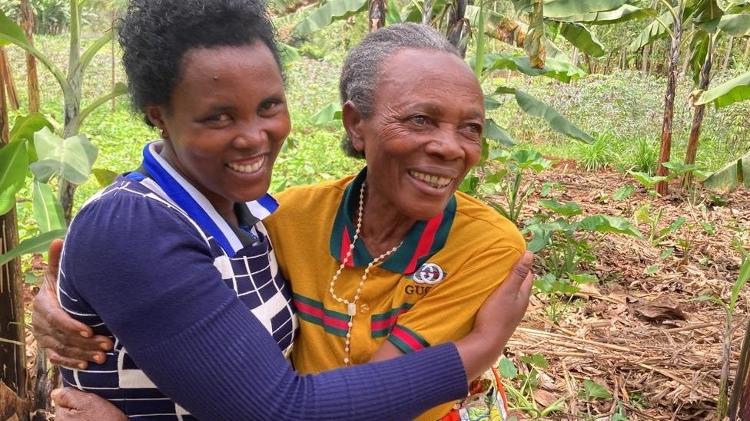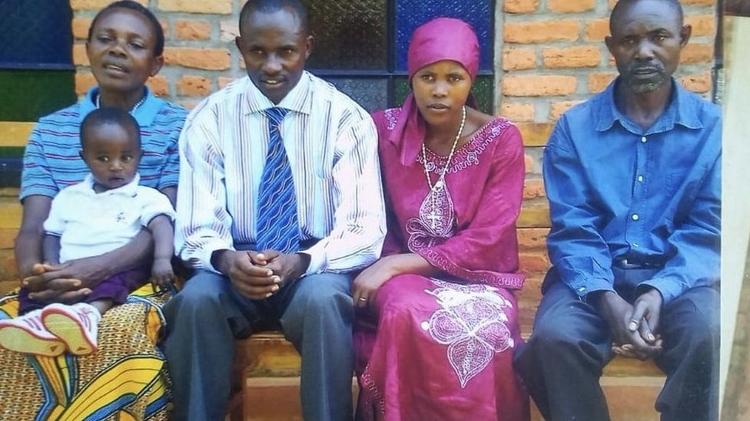It takes love to heal wounds – so a woman who forgave the man who killed her husband during the Rwandan genocide 28 years ago also believes she is a woman who allowed her daughter to marry her son.
Bernadette Mukakabera told her story as part of the Catholic Church’s efforts to reconcile a society torn since 1994, when an estimated 800,000 people were killed in 100 days.
“Our children had nothing to do with what happened. They just fell in love and nothing should stop people from loving each other,” Bernadette told the BBC.
She and her husband were from the Kabera Vedaste Tutsi community and were persecuted after a plane carrying the Rwandan President, an ethnic Hutu, was shot down on April 6, 1994.
Within hours, thousands of Hutu, brainwashed by decades of hate propaganda, turned towards their Tutsi neighbors across the country and began plotting assassinations.
One of them was Gratien Nyaminani, whose family lived near Bernadette’s home in Mushaka, western Rwanda. Both families were farmers.
After the massacres ended, hundreds of thousands of people accused of involvement in the killings were detained when a Tutsi rebel group came to power.
Gratien was arrested and later tried by a community court known as gacaca, which was created to deal with suspicion of involvement in the genocide.
At these weekly hearings, the communities had the chance to face-to-face with the defendants and to listen and testify about what happened and how it happened.
In 2004, Gratien told Bernadette how she killed her husband and apologized. At the same hearing, she chose to forgive him.
This meant that he had to serve two years of community service, not 19 years in prison.
‘I wanted to help’
During his 10 years in detention, his family tried to make amends with Bernadette and their son Alfred, who was about 14 years old when his father was killed, before making a public apology.
Gratien’s daughter Yankurije Donata, who was about nine years old at the time of the Holocaust, went to Bernadette’s house and began helping with the housework.
“I decided to help Alfred’s mother with the housework and farm work because my father was responsible for her husband’s death and she had no one else to help her,” Yankurije told the BBC.
“I think Alfred fell in love with me while helping his mother.”
Bernadette was fascinated by his thinking: “She helped me, knowing very well that her father had killed my husband. Since my son was in boarding school, he knew that I had no help. I loved his love and demeanor – so I did not refuse him to be my son’s wife.”
But for Gratien, it wasn’t that simple – she was initially skeptical when she learned of the marriage proposal.
“She wondered how and why a family she had hurt so much would want to connect with her daughter,” Yankurije said. said.
He was finally convinced and blessed the union. Bernadette showed that she had no issues with Yankurije.
“I felt no resentment towards my daughter-in-law because of her father’s behavior,” says Bernadette. “I felt like she could be the best bride for me because she understood me better than anyone. I convinced my son to marry her.”
The couple got married in the local Catholic church in 2008.
After completing community service two years ago, Gratien pleaded for forgiveness and made a public confession.
‘No compromise, no unity’
The church has been at the center of efforts to bring communities in the region together.
Father Ngoboka Theogene of Cyangugu Diocese said that people have embraced the program of reconciliation. Several other sects are working with similar initiatives.
Churches realize that people have no choice but to live together, much better than to do so in peace and understanding.
“Those accused of genocide crimes cannot receive ordinances until they are reconciled with the families of their victims,” Father Ngoboka explains.
The final reconciliation takes place in public, on an occasion where the accused and the victims are together.
“The victim extends his hands to the accused as a sign of forgiveness,” he says.
A recent event in Mushaka marked the 28th anniversary of the Holocaust and promoted ways for communities to live together. Not long ago, Gratien had died.
“When we talk about change, it’s not about changing skin color, it’s about changing character,” said event organizer Apiane Nangwahabo of Mushaka Parish.
“A change in emotions is important before deciding to live a holy life.”
Bernadette spoke about her son’s marriage to the daughter of her husband’s murderer here.
“I love my bride very much and I don’t know how I would have survived if my husband wasn’t here to help me after he died.”
She says she was impressed to see that Alfred and Yankurije’s love story has prompted many to seek forgiveness and forgiveness.
source: Noticias


